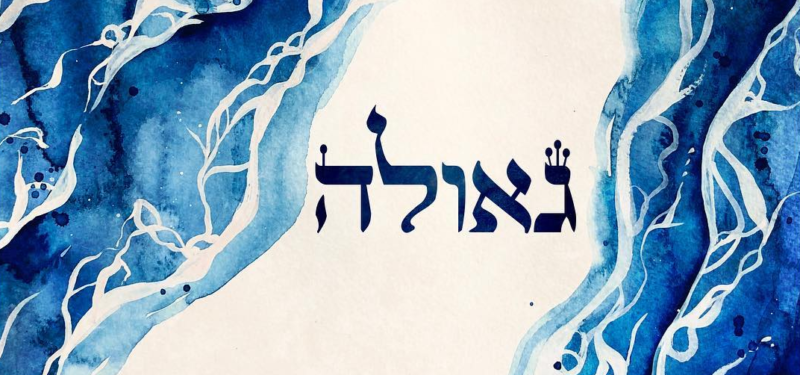Does War Exempt Us from Simchah?

A Practical Strategy to Survive the Darkness
Let's be honest. No matter who we are or what we do, the war is taking its toll on us, sucking away our vitality. Many of us are sad or depressed. Grief, despair, worry, and sleepless nights are all on the rise. We are either directly suffering from the loss of a loved one or else acquainted with someone who is. Further, there seems to be no end in sight with antisemitism rampant worldwide, and Esav, Yishmael and the Erev Rav allied against us. In short, we are in the midst of the plague of darkness just before the final plague, the smiting of the firstborn. And yet, even though the geulah was just around the corner, many Jews never lived to see it, having lost their lives during the plague of darkness. (Rashi on Shemot 13:18 states that 80% of them perished.) How come so many Jews were unworthy of geulah? And why was it davka during the plague of darkness and not during some other plague that these Jews died?
It is taught in Likutei Halachot (Birkat Hoda'ah 6:57): כִּי עִקַּר מְרִירוּת הַגָּלוּת הוּא הָעַצְבוּת (The essence of the bitterness of galut is sadness). Pharaoh knew this and did everything he could to increase depression, sadness and despair among the Jewish People. In fact, he helped set into motion a vicious cycle, also explained in Birkat Hoda'ah 6:57: וְכָל מַה שֶּׁמַּכְבִּידִין הַגָּלוּת מִתְגַּבֵּר הָעַצְבוּת יוֹתֵר וְכֵן כָּל מַה שֶּׁמִּתְגַּבֵּר הָעַצְבוּת שֶׁהוּא גָּלוּת הַשְּׁכִינָה מִתְגַּבֵּר גָּלוּת וְהָעַבְדוּת הַגַּשְׁמִי יוֹתֵר (And everything that makes the experience of galut heavier increases sadness more, and everything that increases sadness, which is the galut of the Shechinah, increases galut and physical slavery all the more).
How can such a vicious cycle be broken? The only way to break the vicious cycle of galut leading to sadness and depression which then leads to deeper galut which then leads to more sadness and depression and so on, i.e. the only way out of the agony of galut, is through simchah! Yes, you read that correctly. We know this was true of our ancestors, for it is stated explicitly in Tehillim 106:44: וַיַּרְא בַּצַּר לָהֶם בְּשׇׁמְעוֹ אֶת־רִנָּתָם (And He saw their distress when He heard their joyful singing). They might have cried out and screamed to Hashem for relief for quite some time, but He only paid attention to them when they starting singing with happiness, even in the midst of the darkness. Who taught them this tremendous secret? It says in Tehillim 105:43: וַיּוֹצִא עַמּוֹ בְשָׂשׂוֹן בְּרִנָּה אֶת־בְּחִירָיו (And He brought out His nation with joy, His chosen ones with rinah). Who were these ‘chosen ones’ who understood that redemption comes through happy singing, i.e. rinah? The Malbim writes in his commentary to Sefer Tehillim: כמ"ש חז"ל במכילתא שהצדיקים בחירי ה' אמרו שירות ותשבחות (As Chazal said in the Mechilta, the tzaddikim, the chosen ones of Hashem, recited songs and praises). How true it is that without our tzaddikim, we are completely lost. And just as it was true for our ancestors, it is true for us today. Referring to the final geulah, the prophet said (Yeshayah 55:12): כִּי־בְשִׂמְחָה תֵצֵאוּ (For through simchah you shall come out).
But is it even possible to have simchah during such a time as this? Better yet, are we even supposed to have simchah during a war? Would having simchah make a mockery out of our suffering and the suffering of others? Would experiencing simchah indicate that we're not quite in touch with reality, and that perhaps we ought to be locked up and given sedation, chas v'shalom?
Where does simchah come from anyway? Think about it. What do we do in our quest for simchah? We work harder so we can make more money or get that promotion for the private office with a view. But then we go on a vacation to escape the endless nightmare of our work. We drink alcohol (or smoke a little something or take a few pills) to get that little lift at the end of the day. Maybe we have more refined tastes, so instead of being attracted to the escapism offered by alcohol or drugs, we head off to a concert or a play. Or we get together with a bunch of our friends and play games for hours. We go to a fine restaurant or cook an excellent meal. At least that's not as bad as sitting in front of a computer to see what we can see, right? The truth is that each of these activities (and the list could go on ad infinitum) reveal that we are all suffering from the same malady. We don't have simchah and we don't know where to find it. And even if we stumble across it, or perhaps better, stumble across what we think is simchah, it's only temporary. Once the activity ends, the supposed simchah ends with it.
This is similar to what Chazal taught in Pirkei Avot 5:16: כָּל אַהֲבָה שֶׁהִיא תְלוּיָה בְדָבָר בָּטֵל דָּבָר בְּטֵלָה אַהֲבָה וְשֶׁאֵינָהּ תְּלוּיָה בְדָבָר אֵינָהּ בְּטֵלָה לְעוֹלָם (All love that depends on something, when that 'something' ceases, the love ceases; and [all love] that doesn't depend on anything, will never cease, ever). The same is true about simchah. Any so-called simchah that depends on something is not really simchah. You know you have true simchah, when you realize that your simchah is not dependent on anything! Take away the vacations, the great job, the influence and respect among your peers, the spacious apartment, the loving family, the friends, etc. and what happens? If you'd still be happy, then you have simchah. If not…well, let's read on.
The truth is that simchah is a spiritual condition of the human soul that cannot be obtained by the kinds of pursuits that we have mentioned. It's just impossible. The traditional 'pursuit of happiness' paradigm that many hold so dear, is an illusion. Simchah can't be pursued because it is not something that we can acquire for ourselves. True simchah can only be acquired as a gift, a gift from the Ribono shel Olam, as it says in Tehillim 4:8: נָתַתָּה שִׂמְחָה בְלִבִּי מֵעֵת דְּגָנָם וְתִירוֹשָׁם רָבּוּ (You put simchah in my heart at the time when their grain and their wine is abundant). Simchah can only come from Hashem. Why is this so? Because the essence of true simchah is the direct result of the revelation of the Divine in this world. And that's why David ha-Melech mentioned the gift of simchah from Hashem davka at the moment when other people were experiencing happiness and joy (even when he wasn't)! So we see that true simchah has nothing to do with the acquisition or the pursuit of things for ourselves. When we look for and find the good in another Jew, and rejoice in that, even if that other Jew may criticize or even persecute us from time to time, Hashem gives us the gift of simchah.
How does it work? Simchah can only reside in a straight heart (Tehillim 97:11): אוֹר זָרֻעַ לַצַּדִּיק וּלְיִשְׁרֵי־לֵב שִׂמְחָה (Light is sown for the Tzaddik, and to the upright of heart, simchah). Therefore, when we look for the good point(s) in another Jew, even if it may seem to us that there aren't any good points, and then we pray to Hashem and plead with Him to give us eyes to see the good, we straighten out our hearts. And when the heart gets straightened out, then simchah can reside in it. It's really that simple—simple to say, perhaps not so simple to put into practice. Nevertheless, if we want to break the vicious cycle of galut and merit the final geulah, we need an upright heart, a straight heart, a heart that sees the good in each and every Jew. When we focus on that instead of the 'unalienable right' known as the 'pursuit of happiness', we become vessels capable of receiving the gift of simchah from Ha-Kadosh Baruch Hu. Therefore, we conclude that simchah comes about when we fix our character traits, when we defeat the Yetzer ha-Ra within us.
Now for some practical tips on what we can do to merit the extraordinary gift of simchah. The word simchah, שִׂמְחָה, is the rashei teivot [ראשי תיבות] for the four fundamental activities that one needs to involve oneself in to merit simchah itself.
The ש stands for שֻׁלְחָן עָרוּך [Shulchan Aruch]. Of course, we need to learn all aspects of the Torah; however, without an intimate knowledge of halachah, we won't know what is required of us. And if we don't know what is required of us, how will we know what to do? How will we ever be able to distinguish and separate the good from the bad? Therefore, we need to learn halachah every day. We acknowledge this fact during Shacharit when we recite the following each day: תָּנָא דְבֵי אֵלִיָּֽהוּ כָּל הַשּׁוֹנֶה הֲלָכוֹת בְּכָל יוֹם מֻבְטָח לוֹ שֶׁהוּא בֶּן עוֹלָם הַבָּא שֶׁנֶּאֱמַר הֲלִיכוֹת עוֹלָם לוֹ אַל תִּקְרֵי הֲלִיכוֹת אֶלָּא הֲלָכוֹת (It was taught in the Yeshivah of Eliyahu: Whoever learns halachot every day is assured of Olam ha-Ba, for it is said [Chabakkuk 3:6], 'The ways [halichot] of the world are His.' Do not read halichot, rather halachot).
The מ stands for מִקְוֶה [mikveh]. The importance of personal sanctification is taught explicitly in Yoma 38b: בָּא לִטָּהֵר מְסַיְּיעִין אוֹתוֹ (One who comes to purify himself, they [those in the Heavenly Realm] give him assistance). This teaching is based directly on a verse in the Torah (Yoma 39a): תָּנוּ רַבָּנַן: ״וְהִתְקַדִּשְׁתֶּם וִהְיִיתֶם קְדוֹשִׁים״ אָדָם מְקַדֵּשׁ עַצְמוֹ מְעַט מְקַדְּשִׁין אוֹתוֹ הַרְבֵּה מִלְּמַטָּה מְקַדְּשִׁין אוֹתוֹ מִלְּמַעְלָה בָּעוֹלָם הַזֶּה מְקַדְּשִׁין אוֹתוֹ לָעוֹלָם הַבָּא (The Rabbis taught: 'Sanctify yourselves, and you will become sanctified' [Vayikra 11:44], a person who sanctifies himself a little, they [those in the Heavenly Realm] sanctify him a lot, [if he sanctifies himself] below, they sanctify him above, [if he sanctifies himself] in Olam ha-Zeh, they sanctify him for Olam ha-Ba).
The ח stands for חֲצוֹת [chatzot], rising at halachic midnight and reciting the Tikkun Chatzot over the galut of the Shechinah. If we demonstrate to Hashem that we are willing to sacrifice a little bit of our sleep to share in His grief over the exile of the Shechinah, then perhaps, just perhaps, Hashem might look down upon us to share in our grief over the exile of His people. But why davka at midnight should we rise to pray over the destruction of the Beit ha-Mikdash? Why not do it in the middle of the afternoon or in the morning after Shacharit? It is taught in Likutei Halachot (Hashkamat ha-Boker 1:15): שֶׁזֶּהוּ בְּחִינַת קִימַת חֲצוֹת מַמָּשׁ שֶׁאָז הוּא תַּכְלִית הַקַּטְנוּת וְאָז דַּיְקָא הוּא בְּחִינַת הִתְעוֹרְרוּת הַשֵּׁנָה שֶׁהוּא בְּחִינַת הִתְעוֹרְרוּת מִנְּפִילָתוֹ וּבָזֶה תָּלוּי הַגְּאֻלָּה בִּכְלָל וּבִפְרָט (This is an aspect of rising precisely at midnight for then is the ultimate smallness, for davka then is the aspect of arousal from sleep, which is an aspect of arousal from one’s fallen state, and on this depends redemption, collectively and individually). Further, the prophet directly states that the geulah will come about through the merit of those who rise over the churban (Yeshayah 62:6-7): עַל־חוֹמֹתַיִךְ יְרוּשָׁלִַם הִפְקַדְתִּי שֹׁמְרִים כׇּל־הַיּוֹם וְכׇל־הַלַּיְלָה תָּמִיד לֹא יֶחֱשׁוּ הַמַּזְכִּרִים אֶת־יְהֹוָה אַל־דֳּמִי לָכֶם׃ וְאַל־תִּתְּנוּ דֳמִי לוֹ עַד־יְכוֹנֵן וְעַד־יָשִׂים אֶת־יְרוּשָׁלִַם תְּהִלָּה בָּאָרֶץ (I appointed watchmen upon your walls Yerushalayim, all day and night, constantly, they won’t be silent. Those of you who remind Hashem, do not be quiet! Don’t give Him any quiet until He establishes and makes Yerushalayim a praise on the earth).
Finally, the ה stands for הִתְבּוֹדְדוּת [hitbodedut], the need to pour out one's heart in a private conversation with Hashem, our Creator. Without an hour of hitbodedut each and every day, we cannot possibly attach ourselves to the Infinite Light (Likutei Moharan 52): אַךְ לִזְכּוֹת לָזֶה לְהִכָּלֵל בְּשָׁרְשׁוֹ דְּהַיְנוּ לַחֲזֹר וּלְהִכָּלֵל בְּאַחְדוּת הַשֵּׁם יִתְבָּרַךְ שֶׁהוּא מְחֻיַּב הַמְּצִיאוּת זֶה אִי אֶפְשָׁר לִזְכּוֹת כִּי־אִם עַל־יְדֵי בִּטּוּל שֶׁיְּבַטֵּל עַצְמוֹ לְגַמְרֵי עַד שֶׁיִּהְיֶה נִכְלָל בְּאַחְדוּתוֹ יִתְבָּרַךְ (To merit being encompassed in one’s Source, i.e. to return and be encompassed in the Oneness of Hashem, may He be blessed, Who is the 'Necessary Reality', is only possible through bitul [self-nullification]. A person needs to nullify himself completely to the point that he becomes encompassed in His Oneness, may He be blessed). And how do we achieve bitul? Continuing in L.M. 52: וְאִי אֶפְשָׁר לָבוֹא לִידֵי בִּטּוּל כִּי־אִם עַל־יְדֵי הִתְבּוֹדְדוּת (It is impossible to achieve bitul except through hitbodedut).
The geulah is coming. There is no doubt about that. If we don't want to perish in the darkness, we now know what to do.
One final point. What if you're a woman and you don't have the same obligations as a man when it comes to learning all of the Shulchan Aruch, or going to the mikveh each morning, or getting up at midnight? What's your role in this? Kick your husband out of the house and send him off to the beit midrash, push him out of bed at midnight, and tell him to go to the mikveh. Seriously. We're not joking (not that much anyway). And if you do these things, you'll receive merit alongside him—probably even more so.






